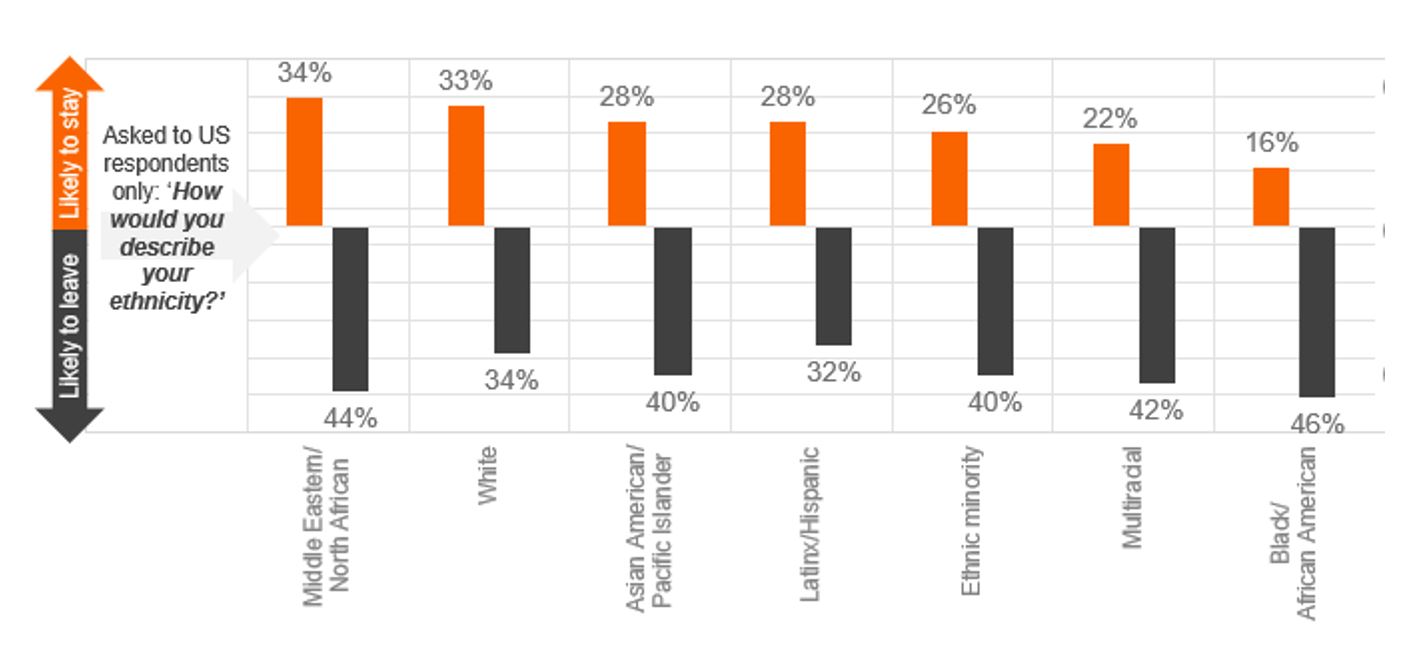Our recent survey shows that some of the least costly and easiest ways for law firms to hang on to their associates and other new hires may be the most effective
Law firm leaders from managing partners to chief strategy officers have pointed out that the biggest challenge they face this year is associate retention. To understand reasons behind the spike in associate attrition, the Thomson Reuters Institute (TRI) conducted a pulse survey of associates in February. We had more than 1,400 US lawyers respond from an array of large, midsize, and small law firms. Their responses provide a few easy-to-implement recommendations that law firms could implement to better address their attrition and retention issues.
Mixed results on compensation
While total compensation — salary plus bonus — is among the top factors that lawyers consider when they’re thinking of moving firms, but is not a strong consideration for staying at their current firm. Indeed, compensation was dead last in order of priorities on what associates like most about their current firms (see table below). Furthermore, no matter through which lens the data was analyzed (age, gender, race or ethnicity, LGBTQ+), compensation was at the bottom of the list of what lawyers like most about their firms.
 What is interesting about the data in the table above is that the variation within the order of lawyers’ 2nd to 4th priorities. All groups ranked people 1st, and compensation 5th (last). Other key takeaways include:
What is interesting about the data in the table above is that the variation within the order of lawyers’ 2nd to 4th priorities. All groups ranked people 1st, and compensation 5th (last). Other key takeaways include:
-
-
- Women prioritized flexibility, culture, and quality of work in their 2nd to 4th priorities, as to what they liked most about their firms.
- Asian Americans & Pacific Islanders (AAPI) and associates identifying as Latin or Hispanic said they preferred quality of work over culture and flexibility.
- Black associates were all about culture and flexibility before quality of work.
-
Factors driving move decisions by associates from underrepresented backgrounds
The data from our pulse research also indicated variation within the top 5 reasons that lawyers gave for why they are thinking of leaving their current firms.
-
-
- Women feel underappreciated. It is the 2nd most-cited reason why they consider leaving, while it is 3rd for other underrepresented associates.
- 71% of associate lawyers identifying as Latin or Hispanic ranked compensation as the top driver of move decisions. The firm’s overall compensation system was a distance 2nd.
- AAPI lawyers ranked the lack of career progression as the 1st driver of moving, when all of the other groups ranked it as 4th or 5th.
- A firm’s lack of interest in lawyers’ well-being was ranked by Black associates and LGBTQ+ lawyers as 2nd and 3rd, respectively, when others put less emphasis on its importance.
-
 Flight risk high for lawyers identifying as a lawyer of color
Flight risk high for lawyers identifying as a lawyer of color
At least one-third of associates indicated a high likelihood that they would leave their current firm. The flight risk for associates was highest for associates identifying as Black/African American, multiracial, and Middle Eastern/North African (see graphic below).
 Factors, if changed, would encourage associates to stay
Factors, if changed, would encourage associates to stay
Luckily for many law firms, there was less variation in the factors that, if altered, would increase the chances that associates would stay. Notably, to retain LGBTQ+ and Black lawyers, law firms need to make more investments in increasing career progression. Also, if firm management showed appreciation more consistently it would help to increase the chances that associates under 40 years of age, or identifying as AAPI or Latin/Hispanic would stay at their current employers.
 Taking in all of this data, it is clear that law firms have the opportunity to double-down on what associates appreciate most about the firm in order to improve retention. Such actions include:
Taking in all of this data, it is clear that law firms have the opportunity to double-down on what associates appreciate most about the firm in order to improve retention. Such actions include:
-
-
- Say thank you — A lack of appreciation was a top 5 factor for lawyers leaving their current firms, especially among women, who ranked it 2nd out of all of the others. Clearly, this is one of the most cost-effective ways to retain talent.
- Analyze compensation for equity — Conducting pay equity analyses can go a long way in retaining talent. In particular, this could be a key way to retain associates who identify as Latin or Hispanic. Indeed, these associates indicated that compensation was the top driver in their decision to move to another firm.
- Work on career progression options — Law firms should expand options for career paths beyond the path to partnership. This was especially emphasized by AAPI associates, who indicated that it was the top factor in staying and leaving decisions. Another way law firms can enhance career development is to increase coaching and mentoring, which associate respondents indicated was a top 5 factor that would encourage them to stay at their current employer.
- Increase the quality of career development conversations — Managers, supervisors of work, and those delivering performance evaluations play an important role in associates’ perceptions of the employee experience, which influences engagement, a sense of belonging, and retention.
-
These investments of time and energy will help law firms boost retention of younger lawyers and associates from underrepresented backgrounds and reduce the costs of attrition. Partners’ time spent recruiting and developing associates carries with it a burden for the partners and the firm, beyond just the loss of potential revenue (had the partner spent that time on billable work.)
At six figures per associate, multiplied by the current rates of attrition experienced by many firms, the cost of clarifying career paths, treating people with respect, or offering a simple “Thank you, well done!” are worthwhile, cost-effective collective habits for law firms to execute.







